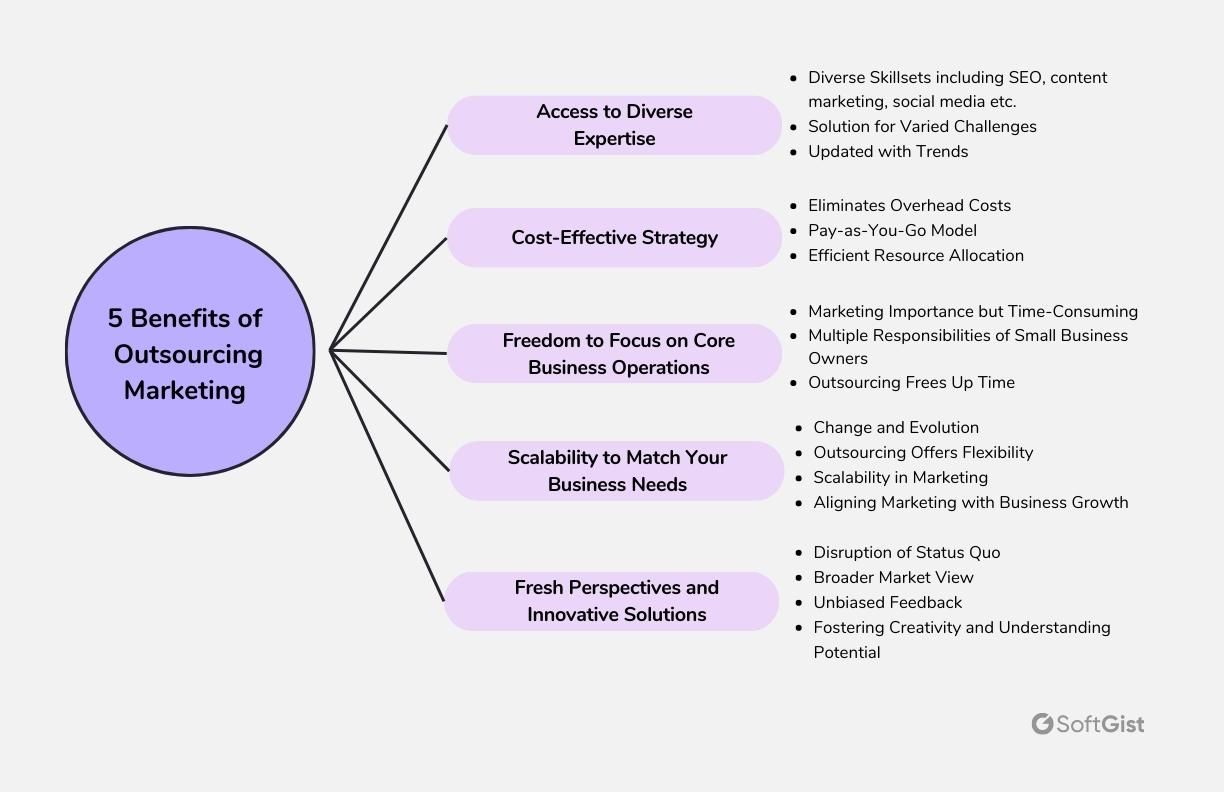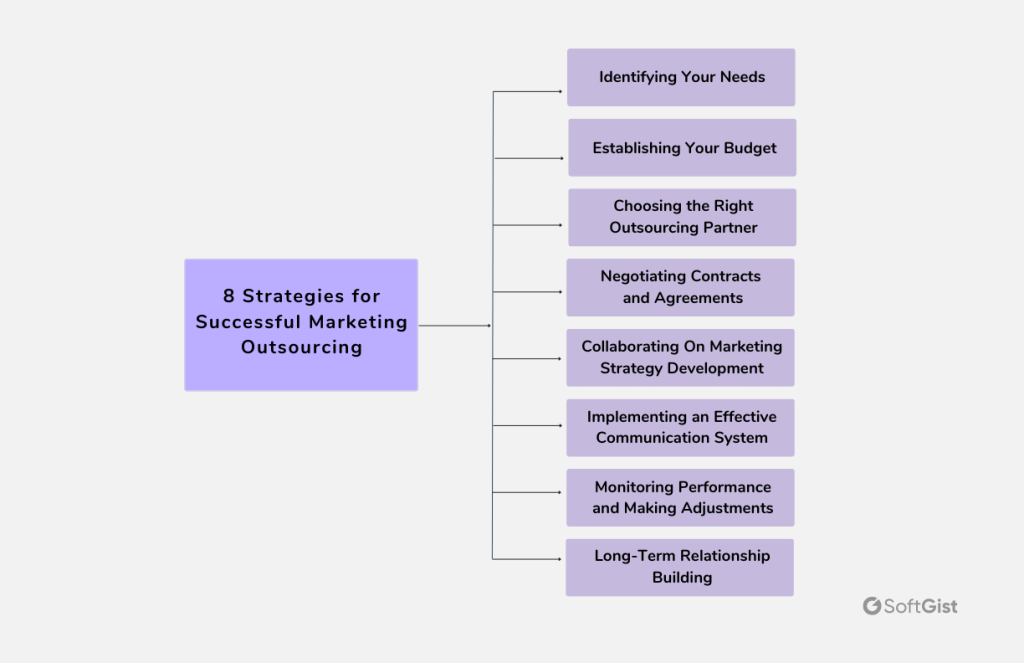Ultimate Guide to Outsourcing Marketing for Small Business
Updated June 6, 2024
Published June 7, 2023

Is outsourcing marketing a good idea for your small business? It can be an efficient way to get expertise and carry out strategies. But there are also important things to consider.
This guide looks at the benefits of having another company do your marketing. It also offers practical tips for successfully outsourcing your marketing tasks. We want to provide you with essential information to make smart choices about outsourcing marketing.
Let’s dive in!
What is Outsourcing Marketing?
Outsourcing means having another company or person do certain business tasks or functions that they specialize in.
Outsourcing means handing your marketing activities over to marketing experts outside your company. This includes making digital marketing plans, creating and organizing content, managing social media, optimizing for search engines (SEO), running pay-per-click (PPC) ad campaigns, sending email marketing, and more.
The important question is – why should a small business think about outsourcing its marketing work? To answer this question, let’s explore the benefits of outsourcing marketing for a small business.

The Benefits of Outsourcing Marketing for Small Business
Outsourcing your marketing tasks offers various benefits, each contributing to your business’ overall growth and success. This section delves into the top advantages of outsourcing marketing for small businesses.

Access to Diverse Expertise
A key benefit of outsourcing marketing is access to a diverse range of specialized expertise and experience.
Outsourcing provides access to a team of marketing professionals, each excelling in areas like SEO, content marketing, social media advertising, and more. This collective expertise allows them to address a wide variety of marketing challenges.
The team can devise integrated strategies that cover every aspect of your marketing needs. Their diverse backgrounds ensure all elements of your strategy receive focused attention and expertise.
In addition, these specialists stay on top of the latest marketing trends, tools, and strategies through regular industry engagement. This constant exposure contributes to their expanding knowledge.
It allows them to bring innovative tactics, best practices, and fresh ideas to enhance your marketing efforts. Their real-world experience implementing campaigns across industries gives them unique insights and can elevate your marketing success.
Cost-Effective
Outsourcing marketing can lead to significant cost savings for small businesses. One major way it does this is by reducing overhead expenses associated with hiring, training, and maintaining full-time in-house marketing staff. With outsourcing, companies only pay for the specific marketing services they need. This on-demand model leads to substantially lower costs compared to carrying salaried employees.
Additionally, outsourcing allows small businesses to access specialized marketing skills and expertise without incurring the high salaries required for such staff or the costs of expensive marketing software. Tapping into outsourced talent saves workforce costs compared to building an in-house team.
Outsourcing also enables improved resource allocation for small businesses. Businesses can focus on their most critical and productive areas by handing off marketing tasks to external specialists. This strategic reallocation boosts operational efficiency and provides long-term financial benefits.
Furthermore, outsourced marketing costs can vary widely based on project scope, complexity, and timeline. Long-term contracts with providers may also offer volume discounts, providing additional cost advantages.
Finally, well-executed outsourced marketing can increase campaign effectiveness, sales, and revenue, enhancing the return on investment from marketing spend.
Freedom to Focus on Core Business
Outsourcing marketing takes the day-to-day marketing work off the plates of small business owners. This frees up their time to focus on improving their business.
Instead of doing all the hands-on marketing tasks, owners can spend their effort improving products, serving customers better, streamlining how the business runs, and deciding future growth plans.
Marketing is still needed, but doing everything themselves can distract owners. Outsourcing allows them to handle detailed marketing work like managing campaigns and analyzing data.
This lifts the burden so owners can focus on big-picture entrepreneurial tasks – innovating, expanding, and strengthening their core business offerings. Outsourcing allows them to focus where it matters most.
Scalability to Match Your Business Needs
Outsourcing marketing allows small businesses to scale their marketing up or down easily, helping them adjust their strategies to match their business needs and budget. It is beneficial when the business grows or the market changes.
Marketing agencies can quickly increase or decrease their work to fit the business. This avoids the problem of hiring and training new in-house staff every time needs change. Outside specialists help companies react quickly when new chances or challenges pop up.
Outsourcing also lets small businesses tap into different marketing experts with specialized skills. As marketing needs grow, small businesses can scale things effectively. Costs stay controlled since you only pay for the services you require.
In short, outsourced marketing gives small businesses the agility to adjust their strategies to match their situation. It enables quick responses to new opportunities, efficient growth, and ongoing success.
Fresh Perspectives and innovative solutions
Outsourcing marketing provides valuable new perspectives that drive innovation and adaptation, which is crucial for success in today’s rapidly evolving landscape.
When immersed in daily operations, it’s easy for businesses to get stuck in habitual thinking patterns. An external marketing agency can disrupt this status quo with new strategies and insights for creatively engaging audiences.
Agencies analyze the broader market to identify opportunities and threats you may miss internally. Their experience helps tailor strategies optimized for current conditions when entering new markets or launching new products.
Outsourced teams also give unbiased feedback on marketing performance. Their outside perspective reveals areas for improvement and refinement.
Incorporating these fresh viewpoints fuels creativity, understanding, and innovation in your marketing. It provides new thinking that reshapes strategies for continued competitiveness.
Infusing a marketing partner’s energy, ideas, and strategic input is invaluable in a fast-paced, ever-changing environment.
Strategies for Successful Marketing Outsourcing
Now that we have explored the potential benefits of outsourcing marketing let’s delve into the practical steps toward successful outsourcing:

Identifying Your Needs
Before searching for an outsourcing partner, identify your specific marketing needs and objectives. Understanding your needs will help you communicate them effectively to potential agencies. It also ensures the partnership aligns with and supports your broader business strategy.
Consider both your immediate marketing goals, like lead generation, social media engagement, website traffic, conversions, and longer-term brand objectives around awareness and customer loyalty.
Define whether your focus is to drive website traffic, increase conversions and sales, boost brand awareness, or build customer loyalty. Clarify your timeline and metrics for success.
Clearly articulating your marketing objectives, and tying them to overarching business goals, provides a roadmap for the outsourcing relationship. It enables selecting a partner who can fulfill your needs and drive success. Defining your marketing needs and strategy upfront is key.
Establishing Your Budget
When outsourcing marketing, establish a budget that balances affordability with expected return on investment (ROI). Consider both immediate costs and long-term value when determining your budget.
Outsourcing often provides lower overall costs than an in-house team, given the flexibility to adjust spending as needs fluctuate. View your budget as an investment in growth, visibility, and customer engagement over time.
Also, factor in scalability, as your marketing needs will evolve as the business grows. A good agency partner can cost-effectively scale their services up or down to match your needs. Planning your budget with scalability in mind ensures your investment continues driving success.
The key is allocating a budget aligned with your marketing objectives and broader business goals. An optimized budget empowers your outsourcing partner to execute strategies that boost your ROI through increased sales, conversions, and revenue. Plan your budget with an eye to the future.
Choosing the Right Outsourcing Partner
Thoroughly research potential partners to choose an agency that understands your business, values, and objectives. Examine customer reviews, evaluate their previous work, and have in-depth discussions to identify the best fit.
Look for expertise aligning with your specific marketing goals around content, PPC ads, SEO, and social media. The partner should offer strengths in the capabilities you aim to enhance.
Careful vetting is critical to finding an ally that grasps your business and can propel your marketing success. They should demonstrate experience executing strategies similar to your goals.
Choose a partner who asks insightful questions, actively listens, and collaborates to understand your brand and vision deeply. Aligning values and outlook from the start enables a relationship built on trust and transparency.
Selecting the right outsourcing marketing partner provides the foundation for impactful strategies tailored to your business needs. It’s an investment in your future growth.
Negotiating Contracts and Agreements
When outsourcing marketing, ensure contracts and agreements are negotiated clearly and precisely.
Detail the agency’s exact services and align expectations on deliverables, timelines, and success metrics. Discuss pricing structures and payment terms that fit your budgetary needs.
Address contingencies like contract termination, including required notice periods and transition plans to prevent disruptions. Have a legal professional review contract to protect your interests.
Once an outsourcing partner is selected, collaborate to develop a comprehensive marketing strategy aligned with your business goals and values.
Reliable agencies will explain their strategic recommendations and how proposed tactics achieve your objectives. With a robust strategy, the agency executes the planned initiatives, from engaging content creation to campaign management and performance tracking.
Leverage their expertise in execution, but stay involved through open communication and performance reviews. This transparency builds a trusting, fruitful partnership positioned for long-term success.
Collaborating on Marketing Strategy Development
Once an outsourcing partner is selected, collaborate closely with them to develop an aligned marketing strategy tailored to your business goals.
Communicate objectives around brand awareness, sales, customer engagement, or other goals. Establish metrics and KPIs to track progress for initiatives like website traffic, conversions, and social media. Set realistic deadlines for completing tasks.
Reliable agencies will offer data-driven strategic recommendations based on their experience and knowledge. Their outside expertise provides fresh perspectives on improving your strategy and overcoming challenges.
Conduct regular reviews of performance data to assess effectiveness and make adjustments. This ensures the strategy stays aligned with your evolving business goals and adapts to changing market dynamics.
This collaborative approach to building a marketing strategy leverages the partner’s expertise while keeping efforts tailored to your needs. It integrates their insight with your business knowledge to create cohesive plans.
With a strategic foundation built jointly, the outsourcing partner can then effectively execute campaigns designed to drive awareness, engagement, and growth for your brand.
Implementing an Effective Communication System
Outsourcing marketing requires consistent engagement through open communication channels. Establish a schedule for regular check-ins and reviews that suits both parties.
Use efficient communication tools like email, phone/video calls, project management platforms, and face-to-face meetings as needed. Timely feedback enables the agency to refine strategies and respond swiftly to changes.
Frequent communication fosters an environment of collaboration and idea exchange. It allows both parties to share feedback, suggest improvements, and fine-tune the marketing approach. Offer constructive feedback and maintain an open mind to recommendations.
Clear and consistent communication ensures alignment with your business goals. It keeps the outsourcing relationship dynamic and collaborative. Proactive communication empowers the agency to optimize efforts for maximum effectiveness as market conditions evolve.
Monitoring Performance and Making Adjustments
Consistently monitor your outsourced marketing agency’s performance using key performance indicators (KPIs) aligned with your business goals. Conduct regular evaluations to understand if marketing strategies are producing desired results.
Utilize metrics like website traffic, conversion rates, engagement, and acquisition costs directly tied to business objectives. Perform monthly or quarterly reviews of KPIs to quantify campaign and overall performance.
Assess the ROI and impact on business goals after each campaign. Identify what worked well and areas needing improvement. These insights should drive adjustments to target audiences, messaging, channels, and other marketing strategy elements.
In addition to adjustments based on performance data, adapt strategies to capitalize on market trend changes in technology, consumer behavior, and new opportunities.
Ongoing monitoring, objective evaluations, and data-driven adjustments are essential. This process ensures marketing strategies continuously evolve to align with business goals and keep pace with an ever-changing market. It enables optimization for greater ROI.
Long-Term Relationship Building
A robust and enduring relationship with your outsourcing marketing partner is crucial for long-term success. The foundation is open communication, shared vision, adaptability, trust, and mutual benefit.
Open and consistent communication allows discussion of goals, strategies, metrics, challenges, and concerns. Regular meetings ensure alignment on objectives and expectations.
A shared vision entails agreeing on business goals, marketing strategies to achieve them, and how success will be measured. This alignment focuses efforts toward shared objectives in a collaborative spirit.
In the constantly evolving landscape, willingness to adapt strategies based on new technologies, consumer behaviors, and market trends is essential. This ensures marketing remains practical and relevant.
Mutual trust involves confidence in the partner’s expertise and commitment to your success. The partner must also trust your vision and dedication to the relationship. This fosters security and belief in the partnership.
The relationship should bring reciprocal benefits. You gain tailored marketing driving growth, while your partner gains a consistent, understanding client who values their contributions.
Nurturing these elements creates an enduring relationship enabling impactful marketing. It becomes a trusted partnership built to navigate changes and drive long-term success through mutual commitment.
Final Thoughts
Outsourcing marketing can provide small businesses with essential expertise and strategies without the costs and distractions of handling it internally. By tapping specialized agencies, small businesses can focus on core operations, gain fresh perspectives, and scale marketing quickly as needs evolve.
While thoroughly assessing providers is critical, the benefits of outsourcing make it an increasingly vital strategy for small businesses survival and competitiveness. With an aligned outsourcing partner, small companies can compete and unlock new opportunities for growth and success.
The time is now to explore outsourcing your marketing. By taking this strategic step, you position your small business to thrive amidst the dynamism of the modern market.
Share This Post
Alex Powell
Alex Powell is a senior tech and business media writer with a passion for breaking down complex tech topics into easy-to-understand information. He holds a degree in Business Administration and a master's in Journalism. When he's not writing, Alex enjoys hiking and reading books.
Allow cookies
This website uses cookies to enhance the user experience and for essential analytics purposes. By continuing to use the site, you agree to our use of cookies.
